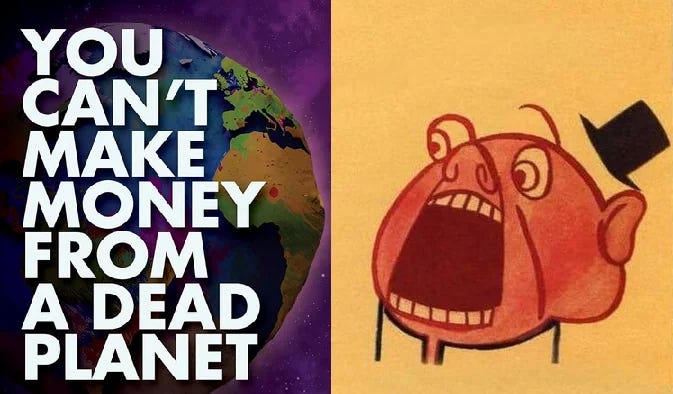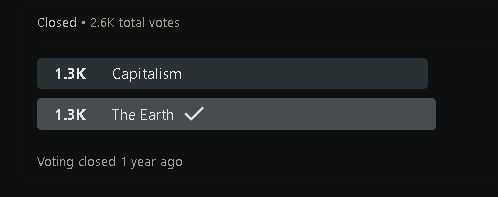What Will Collapse First: Capitalism or the Earth? (September 2023)
Yes, that says 2023 - this is a Throwback Thursday post!
Myth’s Note: As some of my small Substack audience knows, all of my work is typically published first to r/collapse. What some may not know, however, is that not every article makes its way over to this blog; this piece was originally produced for r/collapse back in September 2023 (original thread linked here).
The thread title also served as a “poll question” - and with around 2,600 votes, you’d be genuinely surprised by how close the vote ended up. A screenshot of the voting results is provided at the very bottom of this article.
And so, without further ado, let’s begin!
Today, I'd like to shake things up with a Casual Friday participatory poll. Not only to serve as a bellwether to assess our community's zeitgeist, but as an opportunity for everyone here to share their opinions - both for the record, and for whoever might read this in the future.
After all, there must be some good reasons as to why it is easier to imagine the end of the world rather than an end to capitalism.
And so, without further ado, here's some light reading to go with today's poll: the first quote is for some "homegrown" emotional context (thank you, /u/toni253!), and the second is from an "Anthropocene Marxist" perspective...
-
Pockets of Utopia, Antonio Melonio
[...] It should be quite obvious, at least to all who read this publication, that the current capitalist order is not only incompatible with Utopia, however you might define it, but also doomed to collapse.
Capitalism is based on endless growth, consumption, accumulation, exploitation, inequality, violence, and alienation. It is a system that destroys the natural resources that sustain life and replaces them with artificial needs and desires that, by design, can never be satisfied, and it generates social problems that can never be solved for solving them would mean destroying the system itself.
The signs of collapse are ubiquitous: climate change, ecological annihilation, economic crisis, social division, wars, endless wars. The system is cracking under its own weight. The system is failing us. The system is killing us. [...]
-
Marx in the Anthropocene: Towards The Idea of Degrowth Communism, Kohei Saito -- Pages 127 & 128:
[One] prediction for the future is as apocalyptic as Engels’s ‘revenge of nature’: the degradation of the natural environment generates a crisis for capital one day due to the end of Cheap Nature. However, considering the enormous elasticity of capital, it remains unclear whether capitalism or the Earth will collapse first.
There is no compelling reason to believe that capitalism will collapse under rising production costs and degrading natural conditions of production. This is unlikely, as capital can profit even from natural degradation by finding new opportunities for investment in such disasters too (Burkett 2006: 136). As Naomi Klein (2007) has documented, this possibility is clearly visible in what neoliberal ‘disaster capitalism’ has done in the last decades.
Capital continues to profit from current ecological crises by inventing new business opportunities such as fracking, geo-engineering, genetically modified organisms (GMOs), carbon trading and natural disaster insurance. Incessantly attempting to shift the [metabolic] rift, capitalism can keep going beyond these natural limits and accumulate more wealth.
In contrast, the current level of civilization cannot sustain itself beyond a certain point precisely due to objective natural limits. As far as the logic of capital’s accumulation is being estranged from human life and the sustainability of the ecosystem, the capitalist system might continue to exist, even if all the planetary boundaries are exceeded, but many parts of the earth will be unsuitable for civilization.
In short, there is simply no empirical evidence that the pressure on profit rates due to the increasing costs of circulating capital will bring about an ‘epochal crisis’ any time soon.
For example, it is necessary to realize net zero carbon emissions by 2050 to keep global warming within 1.5°C by 2100 [Myth’s Note: ... lol]. When this line is crossed, various effects might combine, thereby reinforcing their destructive impact on a global scale, especially upon those who live in the Global South. However, capitalist societies in the Global North will not necessarily collapse. This brief example suffices to show an enormous difference between the material conditions for capital accumulation and the maintenance of the liveable ecospheres. [...]
If you enjoyed today’s piece, but you'd prefer a more in-depth look at the interdisciplinary aspects of “collapse”, please consider checking out some of my longform works at my Substack Page – Myth of Progress. That said, as a proud member of this community, I will always endeavour to publish my work to r/collapse first.
My work is free, and will always be free; when it comes to educating others on the challenges of the human predicament, no amount of compensation will suffice... and if you've made it this far, then you have my sincere thanks. Here's one last gift for your time!
Myth’s Note: And, as promised, here are the poll results! Looks like “the Earth” will collapse before capitalism does!





It is a very interesting question and discussion. But I suspect the answer is more granular, more complex.
Western civilisation is based on fossil fuels, as we all know, and the fast-increasing sophistication of it's technology makes it more and more vulnerable to collapse. As an example, imagine if computers suffered a mass breakdown (EMP, a virus, an attack.....), our society wouldn't just lose social media and GPS, but our society's entire history of the last 40 years; all it's money would not just be inaccessible but records of it could disappear, and medical records, along with ownership of companies, even of your house. Your right to a Passport or 'papers' giving you citizenship. Your 'ownership' of your own children. The prisons would empty for lack of criminal records. The borders would either be open to all, or closed.
Most importantly, the supply networks, such as food and fuel, would have to start up again from scratch before we starved or froze, and without money to pay - would that even happen? Could we barter our way back to some kind of order? I really doubt it.
In contrast, many more basic societies, still nominally Capitalist on a smaller scale, have systems that are more resilient, so they may easily survive, barely noticing the chaos in the Western economies. So when you say Capitalism may collapse, the example above may suggest that the grand edifice of Western technological Capitalism could be wiped out, but still the belief in the framework and structure remain and quickly regrow, like a seedling exposed to sunlight.
We can say the same about 'the collapse of the Earth'. Personally, I expect the human population of the Earth to collapse from an unsustainable over-8 billion now back down to around 3 billion, which would still be more than the 2.4 billion it was when I was born in the 1950's. In doing so it would massively reduce the human component of Co2 emissions, as well as signifying a human retreat from human invasion of the biosphere, so allowing many species to reinhabit their lands and ecosystems.
In fact I would support Dr. James Lovelock's work on Gaia, and suggest that a Gaian Earth will itself respond to the 'virus' of humanity giving the Earth a high temperature with it's own cures, like pandemics and climate catastrophes and famines, until the human virus is reduced and the high temperature cured.
But a collapse in humanity is not a collapse of the Earth. As a 'Gaian' I'd see that as a rather messy cure, 'messy' because it would be great if this Gaian Earth could be a bit more selective about those problem people (Westerners with their excessive dependence on fossil fuels) and leave the rest alone!
So to sum up, I suspect the 'end of the world as we know it' will be an end of the vulnerable Westernised world as we know it and, in the process, a return to sustainable levels of humans and the re-establishment of a thriving ecosystem for the rest of life on Earth.
I'm not sure if that makes me an optimist or a pessimist?
Btw, I would like to imagine that the future society will develop a belief system, a 'bogeyman' story of how greedy people once almost destroyed our beautiful planet for an imaginary idea of wealth that, it turned out, didn't actually exist. Something like 'Pandora's Box' meets 'The Emperor's new clothes'.
Because otherwise in 1,000, 5,000 or 10,000 years tine, humans may be doing this shit all over again! Oh well........